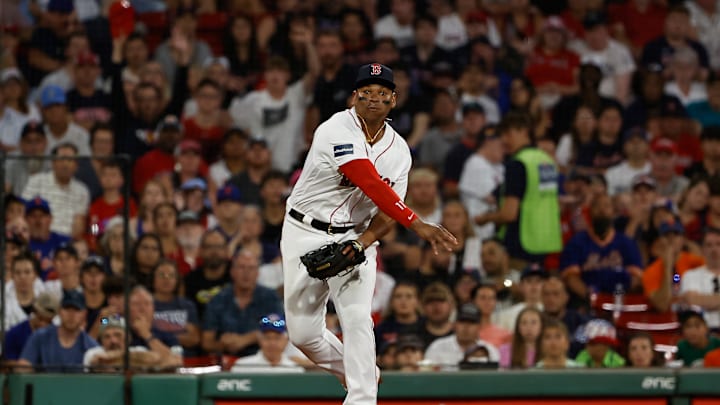When Rafael Devers debuted with the Red Sox in 2017, he made 14 errors in 56 games at third base — a startling 40-error pace. In 2018, his defensive slump continued with 24 errors in 116 games. But, as much as Devers struggled, it’s normal to encounter some defensive woes early in your career. In fact, in their first full seasons, Wade Boggs had 27 errors, Scott Rolen had 24, and Adrian Beltré had 29.
These numbers were all their career highs (or lows, should I say) and all three players went on to win multiple Gold Glove awards. This was the hope for Devers; he’d overcome the rookie jitters, become a reliable defender at the hot corner, and maybe even win a Gold Glove. Okay, maybe not that last part.
Since those first two seasons, Rafael has certainly improved. Based on the tried and true "eye test," he has gained confidence, developed better baseball instincts, and lowered the careless errors that players are more prone to earlier in their careers.
But, if you break down his stats, his improvements on the diamond have been temporary and often marginal. To demonstrate his inconsistency, let’s take a look at his season-to-season DRS (Defensive Runs Saved) and UZR (Ultimate Zone Rating) among qualified third basemen. Those are two advanced fielding metrics that use data on what actually happened as compared to what usually happens when a ball is hit in a similar place/way. Zero is an average fielder.
Starting in 2018, his -11 DRS was third worst and his -4.5 UZR was fifth worst. Not great, but it was still just his sophomore year.
In 2019, "Carita" ("baby face" in Spanish) improved immensely. While he ranked second lowest with a -5 DRS, he had the eighth-best UZR with a 2.7. Not to mention, a huge personal improvement from 2018.
However, in 2020, Raffy took a step back. His -4 DRS ranked fourth lowest and his -5.6 UZR ranked the worst among third basemen and the second worst among all position players.
In 2021, he continued his regression. His -13 DRS ranked 2nd worst — and marked a career low — and his -5.5 UZR was third worst.
But, after clearly putting in some work before the 2022 season, Devers raised his DRS to -6 and his UZR to -2.1. While still a below-average fielder, Devers put up his best numbers since 2019 and it was clear that he and his coaches made a concerted effort to address his shortcomings.
So, could the 2022 season — and his massive January 2023 extension — potentially mark a turning point for Devers’ defense? Sort of. In the current 2023 season, his -8 DRS is worse than last season but his 0.9 UZR sits right in the middle of the third basemen pack.
Rafael Devers has plateaued for the Red Sox at third base
Let's quickly summarize that statistic dump: Raffy improved in 2019, regressed in 2020, regressed even more in 2021, improved in 2022, and has plateaued this season (as the decrease in DRS is similar to the increase in UZR). In sum, inconsistency has defined Raffy's defense across his career.
But why such inconsistency? It’s anyone’s guess. Perhaps he is not putting the necessary work into his fielding; perhaps he is putting the work in but he has reached his defensive ceiling; or, perhaps this is just representative of the ebbs and flows of some players' careers.
Regardless of the underlying reason, he is a liability out there. And despite watching Devers commit the most errors of any position player since 2017 (123), the Red Sox plug him in at third almost every game. In fact, he’s only played 12 games at DH — and a few innings at short and second — in his entire seven years in the show.
While a position change is unlikely and probably ill-advised this deep into his career, I think the Red Sox would benefit from putting him at DH more often or just replacing him at third in close games. Sure, you might lose a Raffy at-bat or even a Raffy moonshot. But, the Red Sox are in an incredibly tight Wild Card race and — as much as it hurts to critique the loveable Carita — a late-game bobble or misfire is not what they need during their playoff push.
